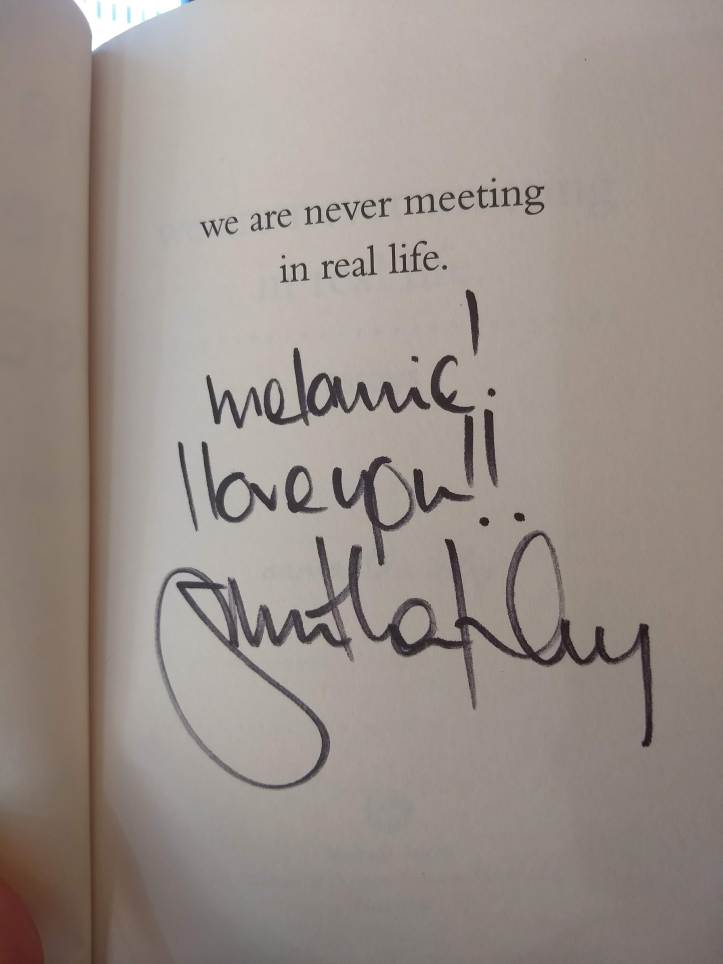In July of this year, I read and reviewed Meaty by Samantha Irby, which was originally published in 2003, but got polished up and re-released by Vintage Books (an imprint of Penguin Random House) in 2013. In 2017, the same press published her follow-up collection of essays, We Are Never Meeting in Real Life. Readers, myself included, think this title is funny because some of us have met Irby. Funny truth: a couple of months after that public reading, I returned to the bookstore and found this on the bathroom wall:

With 14 years between writing her first and second essay collections, I found Irby’s content to be richer, more meaningful, even when on the surface it wouldn’t appear that way. Of course, Irby is still funny. She acknowledges how carefully she crafts her humor in her writing. In a moment of dark humor, Irby imagines her death. How would a woman who eats and lives on survival mode and loves TV more than anything else be found?
I would be dead in my fancy black robe, tits splayed, tomato sauce congealed in the corners of my mouth as Netflix asks judgmentally, “Are you still watching this?”
Even simple moments that demonstrate how Irby, who is now 38, is different from other women. The most obvious is that she is childless, a detail that causes her to lament changed relationships with her friends, “because that baby might be sleeping or eating or doing its taxes, and you are going to mess it all up with your loud, single-person bullshit.” While we’ve all heard about what it’s like to be “behind” in life compared to our friends, Irby adds in a little something — doing taxes — to make the conversation feel funny.

While I don’t think Irby ever wanted children, she does mention she is unable to have children. Here is where the essays reach deeper. After Irby recounts a man named Fred with whom she was very much in love, I was struck cold by his ableist comment:
I tuned back in as he was saying, so fucking gently, “. . . can you really chase a baby around the backyard?” He didn’t mean it in the mean way, I don’t think. Sometimes even when it feels mean it isn’t, I reminded myself. I glanced down at my left hand, curled in a stiff black brace, my feet in their orthopedic sandals.
Even now, as I type this quote, my stomach clenches and I feel sad and sick. I wear hearing aids and can’t see well, among other things. That sadness she endured in that moment with Fred really spoke to me.
In her previous book, the most sad and emotional she got was when she described how her parents — mother 40, father 50 when she was born — got divorced and both physically deteriorated. Her mother became chronically ill, so Irby became the caretaker in high school. She hid her situation from authorities so her mother wouldn’t be taken away. Her father, a homeless alcoholic, was mostly absent from Meaty.
In We Are Never Meeting in Real Life, Irby’s father returns, this time to convince her mother to leave a nursing home because he’s trying to get the $900 the state pays for nursing home rent. Despite protests by Samantha Irby, her mother leaves with her father. He immediately gambles away the money, leaving his ex-wife with no feeding tube, nurses, or occupational therapy. Irby writes about her parents honestly, clearly, and without making them look better than the choices they made.
Lastly, it’s not very common that I relate to anyone in books. Fat characters aren’t terribly well-written, and I have a mishmash of likes that don’t line up to any stereotype, so I don’t expect to see me. *Surprise!* I got this, a mishmash of fat, loves Metallica, hates workout room TV:
Working out is a bummer. Walking on a treadmill for forty-five minutes while listening to the same Metallica playlist over and over and trying to read the closed captioning of a television show you don’t even care about is a total drag.
Then there was an even more surprising moment to which I related: Irby describes how she never drinks juice. She doesn’t even go into the juice aisle. Juice is basically like drinking a soda because you killed all the health benefits by turning the fruit into, well, juice. Instead, it’s more about saving those calories for something “like a slice of the birthday cake that was half-price because little Timmy’s parents never picked it up.” I about died laughing here. I know what she means, I am an anti-juice crusader myself, AND I’ve eaten that on-sale single slice that reads “PPY DAY” because the grocery store diced up a sheet cake. While I never expect a book to be “relatable,” and I definitely side-eye people who bag on books that didn’t “relate to them,” it was also fun to see myself in someone else and on a page.
I can’t wait to read more Irby, and I continue to follow her blog, Bitches Gotta Eat. Despite the title of this collection, Irby was charming at the reading. Is it a technique? She did write this in We Are Never Meeting in Real Life:
. . . but if your mom comes up to me at a reading, then I’m going to look deep into her eyes and say, “You look amazing in magenta, Margaret,” without breaking my gaze, and she is going to swoon and buy six copies of my book and, duh, love me forever.
What kind of jerk would fall for that?


Ppy Day is the best cake day. 👍
LikeLike
🤣
LikeLike
It sounds as though this goes deep, but doesn’t go for melodrama. I like that balance. And I do like the wit I see in the bits that you’ve shared. I like that balance between sharing the sad times, but also having a light touch here and there.
LikeLike
That note on the bathroom stall! It’s so bold and so true. Yeah, that remark by Fred is very insensitive. I’m so glad you found portions of this book to relate to. Hope you get to pick up more of her writing soon!
LikeLike
She doesn’t have anything there published yet, just the two books. There was a lot to discuss that I didn’t cover. Irby gets married to a woman with kids from Kalamazoo. She has a demon cat. She has some hilarious bits about race. All around good stuff.
LikeLiked by 1 person
Aren’t all cats part demon?
LikeLike
This cat attacked a neighbor who stopped by. It’s funny to me that this neighbor was at that reading I went to 😬😂
LikeLiked by 1 person
Like you I don’t need to ‘relate’ but it’s always fun to find yourself hidden in the pages somewhere! Save me a piece of that cake…
LikeLiked by 1 person
You can have the corner piece with the big frosting flower, m’dear.
LikeLiked by 1 person
Aw, thank you! *grabs*
LikeLike
Don’t get me started on gym TV – it’s all bargain hunt stuff on ours then I had to carefully not watch a whole royal wedding once on all the screens. I’m glad you got such a lot out of this book; she sounds like she treads the fine line between pathos and humour very well.
LikeLike
I went to the fancy gym at Notre Dame once, where all exercise machines have their own TV screens on them just to notice all the women were watching Sex And The City 😂
LikeLike
I’m an old white guy and I don’t want to see myself in books. What I find most important is that novels are relatable to the author’s life, that the story and the setting are ‘genuine’. Still, I remember the excitement of my Australian-Italian friends on seeing The Godfather, they felt they were seeing themselves in film for the first time.
LikeLike
I wonder what that was like for your friends, as the folks in The Godfather weren’t great people. They were powerful people, though.
Come to think of it, I’ve never read a book about an old white guy that wasn’t a trope. If someone could do you old white guys justice, I’d read it.
LikeLike
That’s the point, I think, that people of Italian descent had power in an Anglo world. But I also think people like to see themselves portrayed, however idiotically, Australians only pretend to hate Crocodile Dundee.
LikeLike
You guys have us Mick Dundee and Steve Irwin. It’s all we have to work with! 🤣
LikeLike
Sounds like the best kind of essays that can make you laugh and break your heart all at once. Love the inscription!
LikeLike
Yeah, she really struck a balance this time, whereas in her first book, sometimes she was just cruel to herself without making meaning out of it.
LikeLike
Oh this sounds so good! I think I would really like this collection. I’m also against juice, because I want to save my calories (and sugar!) for chocolate.
LikeLike
I think you would like it. You have a bit of devilish humor in you! There was that time you called your toddler an asshole! 🤣
LikeLiked by 1 person
oh you know it!!!
LikeLike
That tax-doing baby sounds as if they have their life together. Can I hire them? :p
LikeLike
OMG, that’s so funny Briana! I can just image a baby pulling out some reading glasses and a lil calculator.
LikeLike
I love the bathroom wall bit. How I wish that every author would do this to the stalls in the venues they attend. Finding yourself on the page is so important; I’m glad you found that here. And also glad that she is reaching so many readers in general. Plus, we need to laugh!
LikeLike
[…] out loud many times, in the same way that I do when I read Samantha Irby’s books (Meaty; We Are Never Meeting in Real Life; and Wow, No Thank […]
LikeLike
[…] We Are Never Meeting in Real Life (2017) […]
LikeLike